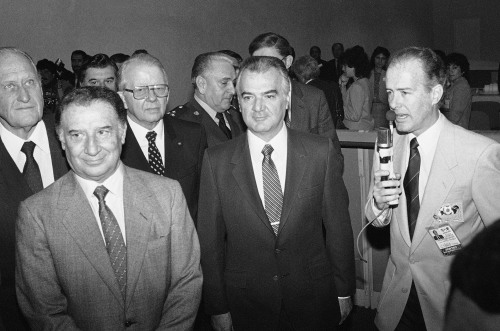
MEXICO CITY (AP) ― Former President Miguel de la Madrid, who led Mexico from 1982 to 1988 during an economic crisis and a devastating earthquake, died Sunday at age 77, the government said.
De la Madrid was the first in a string of presidents who pulled Mexico away from a state-dominated economy and toward free trade by bringing the country into the precursor to the World Trade Organization and by privatizing hundreds of government businesses.
President Felipe Calderon called De la Madrid “a Mexican with a profound commitment to the country” in a statement confirming his death Sunday. The cause of death was not revealed, but the former president had been hospitalized in Mexico City with respiratory problems since Dec. 17.
His term was a grim time for most Mexicans, a six-year hangover after a spending binge by a previous government that was convinced soaring oil prices would never fall. When they did, the buying power of Mexican salaries was slashed in half as inflation chewed up paychecks.
Manuel Bartlett, who was interior secretary during De la Madrid’s administration, told Mexican broadcaster Televisa that the former president served “during one of the most difficult periods in the history of Mexico, a real collapse of the national economy.”
De la Madrid, seen as a discrete and respectful man, pulled Mexico back from economic collapse during his presidency, but left it with a political crisis.
Mexican historian Enrique Krauze said De la Madrid’s biggest failure was that he refused to accept the democratic transition Mexicans sought and got more than a decade later.
“He used to tell me ‘you are too young, your ideas are not practical,’” said Krauze, referring to discussions he had with the former president about suspected election frauds.
The government’s handling of the election to replace De la Madrid caused a political scandal that later helped topple the political system that dominated Mexico for most of the 20th century.
Some critics also see De la Madrid as the leader who was slow to react to Mexico’s devastating magnitude-8 earthquake in 1985, which killed an estimated 9,000 people and flattened parts of the capital.
“There was this nationalist posturing of not accepting international aid when it was clear that Mexico needed it,” Krauze said.
The initial economic panic in his administration was so deep that many thought De la Madrid did well just by not making things worse.
As he put it just before leaving office, “I took a country with great problems and leave it with problems.”
De la Madrid also launched a historic free-market transformation of Mexico’s economy. He sold off about 750 of the 1,155 companies the government had owned when he took office and helped Mexico develop into a global industrial power, although one overwhelmingly dependent on the United States.
De la Madrid was the first in a string of presidents who pulled Mexico away from a state-dominated economy and toward free trade by bringing the country into the precursor to the World Trade Organization and by privatizing hundreds of government businesses.
President Felipe Calderon called De la Madrid “a Mexican with a profound commitment to the country” in a statement confirming his death Sunday. The cause of death was not revealed, but the former president had been hospitalized in Mexico City with respiratory problems since Dec. 17.
His term was a grim time for most Mexicans, a six-year hangover after a spending binge by a previous government that was convinced soaring oil prices would never fall. When they did, the buying power of Mexican salaries was slashed in half as inflation chewed up paychecks.
Manuel Bartlett, who was interior secretary during De la Madrid’s administration, told Mexican broadcaster Televisa that the former president served “during one of the most difficult periods in the history of Mexico, a real collapse of the national economy.”
De la Madrid, seen as a discrete and respectful man, pulled Mexico back from economic collapse during his presidency, but left it with a political crisis.
Mexican historian Enrique Krauze said De la Madrid’s biggest failure was that he refused to accept the democratic transition Mexicans sought and got more than a decade later.
“He used to tell me ‘you are too young, your ideas are not practical,’” said Krauze, referring to discussions he had with the former president about suspected election frauds.
The government’s handling of the election to replace De la Madrid caused a political scandal that later helped topple the political system that dominated Mexico for most of the 20th century.
Some critics also see De la Madrid as the leader who was slow to react to Mexico’s devastating magnitude-8 earthquake in 1985, which killed an estimated 9,000 people and flattened parts of the capital.
“There was this nationalist posturing of not accepting international aid when it was clear that Mexico needed it,” Krauze said.
The initial economic panic in his administration was so deep that many thought De la Madrid did well just by not making things worse.
As he put it just before leaving office, “I took a country with great problems and leave it with problems.”
De la Madrid also launched a historic free-market transformation of Mexico’s economy. He sold off about 750 of the 1,155 companies the government had owned when he took office and helped Mexico develop into a global industrial power, although one overwhelmingly dependent on the United States.
-
Articles by Korea Herald
















![[Up close in Yeouido] Trump hinting at US troop removal in South Korea ‘election-time talk’](http://res.heraldm.com/phpwas/restmb_idxmake.php?idx=652&simg=/content/image/2024/05/21/20240521050695_0.jpg&u=)
![[KH Explains] Hong Kong rally spurs hope for ELS loss mitigation](http://res.heraldm.com/phpwas/restmb_idxmake.php?idx=652&simg=/content/image/2024/05/21/20240521050686_0.jpg&u=)

![[Today’s K-pop] Stray Kids hit Billboard’s Hot 100 with Charlie Puth collab](http://res.heraldm.com/phpwas/restmb_idxmake.php?idx=642&simg=/content/image/2024/05/21/20240521050699_0.jpg&u=20240521182133)